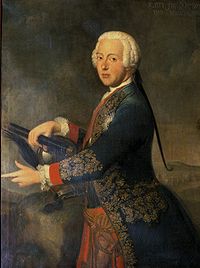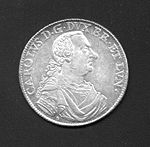
Charles I, Duke of Brunswick-Lüneburg
Encyclopedia

Brunswick-Bevern
Brunswick-Bevern is an extinct German dynasty. It is a branch of the Younger House of Brunswick, a branch of the House of Welf. Its first member was Ferdinand Albert I, Duke of Brunswick-Lüneburg, who received Bevern Palace as part of his inheritance in 1666...
, was ruling as Prince of Wolfenbüttel from 1735 until his death.
Life

Prince Eugene of Savoy
Prince Eugene of Savoy , was one of the most successful military commanders in modern European history, rising to the highest offices of state at the Imperial court in Vienna. Born in Paris to aristocratic Italian parents, Eugene grew up around the French court of King Louis XIV...
against the Ottoman Empire
Ottoman Empire
The Ottoman EmpireIt was usually referred to as the "Ottoman Empire", the "Turkish Empire", the "Ottoman Caliphate" or more commonly "Turkey" by its contemporaries...
before inheriting the Principality of Wolfenbüttel from his father in 1735. On the suggestion of his priest, Johann Friedrich Wilhelm Jerusalem, in 1745 he founded the Collegium Carolinum, an institute of higher education which is today known as the Technical University of Brunswick. He also hired Gotthold Ephraim Lessing
Gotthold Ephraim Lessing
Gotthold Ephraim Lessing was a German writer, philosopher, dramatist, publicist, and art critic, and one of the most outstanding representatives of the Enlightenment era. His plays and theoretical writings substantially influenced the development of German literature...
as the librarian for the Bibliotheca Augusta, the ducal library.
Charles attempted to promote the economic development of his state; for example, he founded the Fürstenberg Porcelain Company, and he installed mandatory fire insurance. However, he did not manage to keep the state finances in check. As a consequence, in 1773 his eldest son Charles William Ferdinand took over government.
Marriage and children
In 1733, Charles married Philippine CharlottePrincess Philippine Charlotte of Prussia
Princess Philippine Charlotte of Prussia was a daughter of Frederick William I of Prussia and Sophia Dorothea of Hanover.-Family:...
, daughter of King Frederick William I of Prussia
Frederick William I of Prussia
Frederick William I of the House of Hohenzollern, was the King in Prussia and Elector of Brandenburg from 1713 until his death...
. They had the following children that reached adulthood:
- Charles William Ferdinand (1735–1806)
- Sophie Caroline MaryDuchess Sophie Caroline Marie of Brunswick-WolfenbüttelDuchess Sophie Caroline Marie of Brunswick-Wolfenbüttel was the eldest daughter of Charles I, Duke of Brunswick-Wolfenbüttel, and his wife Philippine Charlotte of Prussia, sister of Frederick the Great....
(1737–1817), married Frederick, Margrave of Brandenburg-BayreuthFrederick, Margrave of Brandenburg-BayreuthFrederick, Margrave of Brandenburg-Bayreuth , was a member of the House of Hohenzollern and Margrave of Brandenburg-Bayreuth.... - Anna Amalia (1739–1807), married Ernest Augustus II, Duke of Saxe-Weimar-Eisenach
- Frederick Augustus (1740–1805)
- Albert Henry (1742–1761), died childless
- William Adolf (1745–1770), died childless
- Elizabeth Christine UlrikeElisabeth Christine of Brunswick-LüneburgElisabeth Christine of Brunswick-Wolfenbüttel , was the first wife of Prince Frederick William, her cousin and the future king Frederick William II of Prussia....
(1746–1840), married King Frederick William II of PrussiaFrederick William II of PrussiaFrederick William II was the King of Prussia, reigning from 1786 until his death. He was in personal union the Prince-Elector of Brandenburg and the sovereign prince of the Principality of Neuchâtel.-Early life:...
(divorced) - Augusta Dorothea, Abbess of Gandersheim (1749–1803)
- Maximilian Jules LeopoldLeopold of Brunswick-WolfenbüttelMaximilian Julius Leopold of Brunswick-Wolfenbüttel, prince of Brunswick-Wolfenbüttel and nominal duke of Brunswick and Lüneburg was a Prussian general....
(1752–1785), died childless
Charles also had a child out of wedlock, Christian Theodore von Pincier (1750–1824), the adopted son of Baron von Pincier of Sweden. The family received its peerage from King Carl XII
Charles XII of Sweden
Charles XII also Carl of Sweden, , Latinized to Carolus Rex, Turkish: Demirbaş Şarl, also known as Charles the Habitué was the King of the Swedish Empire from 1697 to 1718...
in 1698 in Stockholm.

